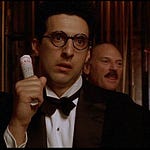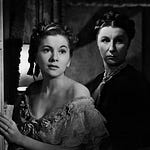Read Part 1, Part 2, and Part 3.
John Berger said that glamour cannot exist “without personal social envy being a common and widespread emotion.” I will pretend, for just a little bit, that we’re helpless against this truism. That it is romantic, rather than implicating.
In profiling legendary talk show host Dick Cavett in earlier installments of this series, I’ve examined the art of the interview mostly in terms of the Interlocutor’s creative choices. But since I think of this art form as a collaborative one, I should also consider the interviewee in this rough survey of what it means to be publicly questioned, sometimes before a live audience and often with the purpose, spoken or otherwise, of generating money-making attention through scandal or humiliation. After spending so much time with Cavett’s interview with actor Richard Burton (which I jokingly refer to as my favorite movie), it seemed only natural that Burton’s ex-ex-wife, actor Elizabeth Taylor—in her time considered one of the most beautiful and controversial women in the world—would appear to me as a fitting subject.
There are countless interviews with Taylor from which to choose, but the first that came to mind was one she held with Barbara Walters in 2006 to promote her book, Elizabeth Taylor: My Love Affair With Jewelry.
The Taylor of my teen years ought to be distinctly unglamorous: an elderly, embittered woman whose tabloid-trashings for her age, weight, marriages, substance use, relationships with other celebrity weirdos, like Michael Jackson, and disjointed political commitments1 are just about as old as my pre-war grandmother. Shilling a book that is a capitalization on her history of glamour, she comes across as wispy, unfocused, goofy. “Shame on you!” she says, searching for a camera to glare at when Walters mentions that the kids of today aren’t familiar with Burton. He was, she says with a snarl, “a hunk!”
Even when I saw this interview for the first time, I sensed the depth of that glamour, legible even for someone who had only seen her onscreen in the live-action version of The Flintstones (1994). Over the years, I return to it for a good laugh, because it really is quite funny. It’s a puff interview for coffee-table book with a woman who is no longer taken seriously, if she ever has been (although Burton, and many others, have praised her talent—as distinct from her beauty or cultural impact—over the years). But still, the glamour is there, straddling grand lady and gay icon to generate the tension required for camp, where worship and denigration, over-identification and ownership, meet in the meat of affective satisfaction.
“This red is from god,” she declaims, gesturing to a chain of rubies among her collection. “And those green little things…” She doesn’t even say “emeralds!” She’s so goddamn rich—the collection was valued at over one-hundred-million at the time—she doesn’t even have to call the rock by its name!
There is something alluring about a woman who will not apologize for being so fabulously wealthy, so fabulously fabulous. She feels like royalty, like she was sent down to earth by god. Her beauty and acclaim is so tightly enmeshed with her scandal and humiliation as to be a part of it, like gemstones in a Cartier necklace, and yet somehow, even with my disbelief unsuspended again, she endears herself to me, this bizarre old woman.
“Personal social envy…” as Berger said. The remarkable thing about having one’s consciousness raised is that what you think doesn’t always change how you feel.
David tweets at @k8bushofficial. Preorder their second novel, X (Catapult, 2022).
Subscribe to support GOOD ADVICE/BAD GAY, an advice series from an anonymous gay therapist who’s not afraid to hurt your feelings with the truth. (Sample an unlocked post for a taste of what you’re missing.) 100% of funds go to support a rotating selection of mutual aid and reparations projects.
Want advice? Email badgayadvice@gmail.com for a free 3-month subscription.
Pro-gay and pro-Zionist—the latter to a weird and disturbing degree—until her death, she anticipated the neoliberal moment, as it were. Icon!












